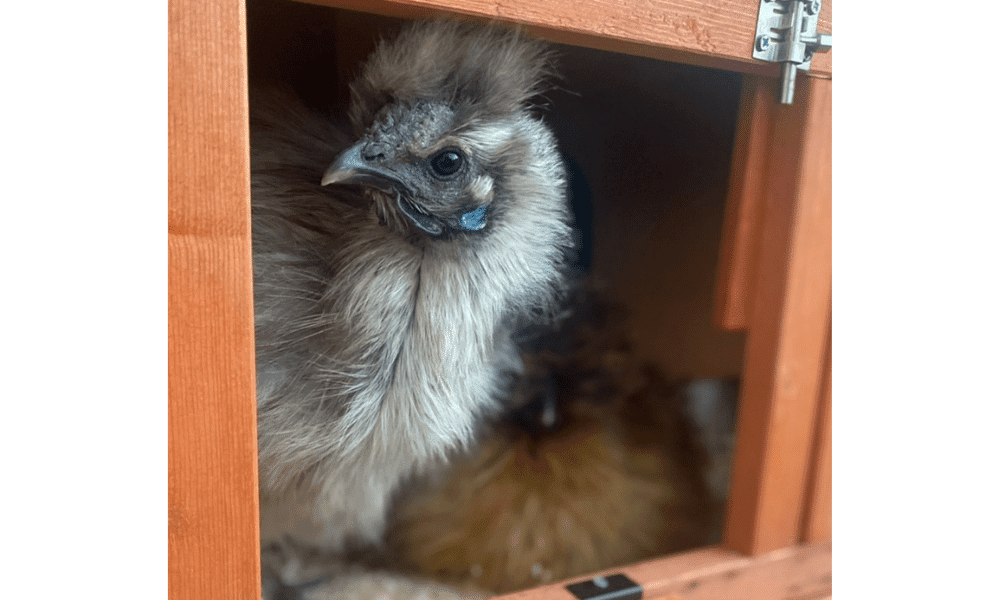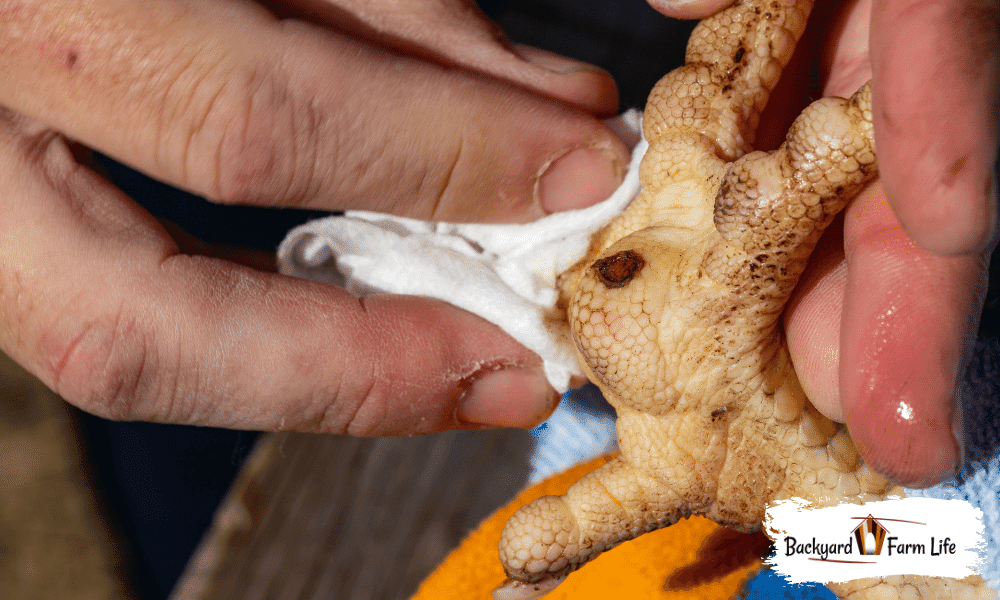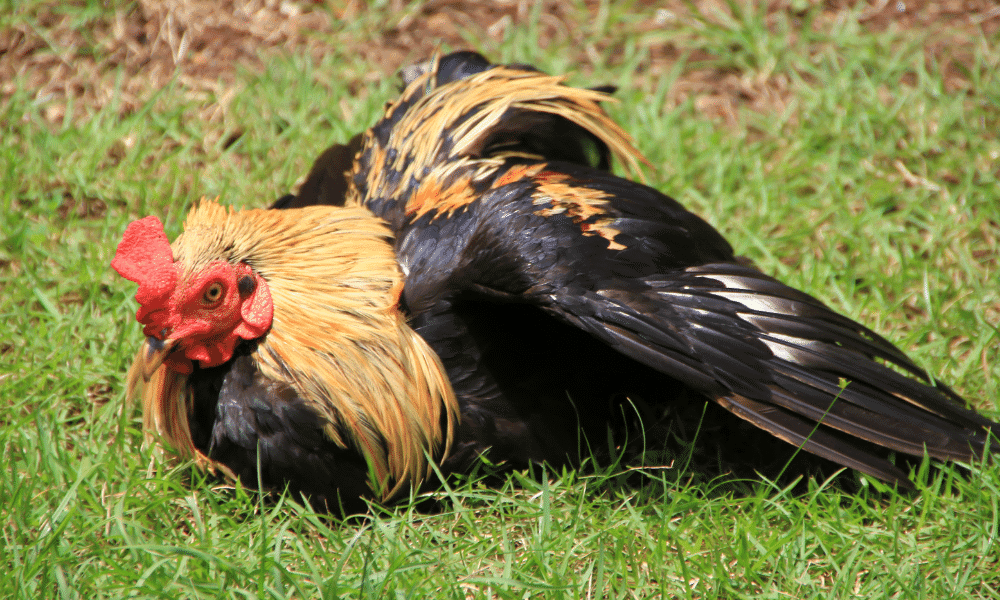At first, it might just seem like your chicken is a little clumsy.
However, when it becomes persistent or starts to get worse, then it’s understandable to become worried about them.
While it’s vital to try to understand the causes of why your chicken keeps falling over, you should always consult with a veterinarian to get the right diagnosis.
Here are some possible causes why some chickens keep falling over or can’t keep their balance, why this happens in baby chicks too, and what can be done about it.
This content is merely informational and should not be treated as professional veterinarian advice.
My Experience With My Chicken That Kept Falling Over

In my case, I raised a grey silkie hen who from about 6 months old started waddling everywhere. She didn’t look stressed, but simply had trouble keeping balance while walking.
We didn’t think too much of it at this stage. But, week after week she slowly began deteriorating, until she would be stretching her leg frequently, and actually falling over when she was walking (or trying to run across the yard for treats!).
In our case, we were able to identify that her toes were curling inward, and she was having trouble standing and walking properly.
After consulting a veterinarian, they suggested it was a vitamin B deficiency, which is common in young chicks and chickens.
I’m not exaggerating here, over the course of 2-4 weeks feeding her a vitamin mix and high vitamin B foods like scrambled eggs she got better and is able to walk normally again. Although she still waddles a bit, she is in no pain and is loving life.
Chicken Keeps Falling Over
A chicken that falls over sometimes can simply be a bit clumsy. If they’re young, they could still be developing and getting to know their bodies.
However, a chicken that keeps falling over, has trouble keeping its balance, and has trouble walking can be a sign of something a bit more concerning.
It’s always incredibly saddening to see any of your chickens under stress or struggling.
Luckily, not all the reasons your chicken keeps falling over are permanent, and many are reversible!
The main reason you’ll find your chickens keep falling over are:
- A Vitamin Deficiency
- Bumblefoot
- A Slight Deformity
- Marek’s Disease
Let’s go further.
Why Chickens Will Keep Falling Over
A staggering chicken could mean a lot of things, and not all of them are life-threatening.
This is why it’s vitally important to inspect your chickens and watch them for any other symptoms, just to get a clearer picture of what your chickens are dealing with.
Here are the most common reasons your chickens keep falling over and what it really means.
Vitamin Deficiency
Just like we humans, chickens need to keep a consistent diet that meets all of their nutritional requirements. This doesn’t just mean getting enough protein and calcium for laying, but it means getting sufficient vitamins and minerals for healthy bodily function and growth.
It’s not uncommon that a chicken suffering from vitamin deficiency will have trouble walking, balancing, and standing up straight.
One common vitamin deficiency which can cause chickens to fall over or have trouble walking is a vitamin B2 deficiency, or riboflavin. This directly impacts a chicken’s ability to balance and walk, and often presents in younger chicks and chickens with a common symptom of curling toes.
Another common vitamin deficiency that leads to a chicken’s inability to walk straight and fall over is vitamin B1, or thiamine. A prolonged deficiency of Vitamin B1 can cause leg weakness and eventually leg paralysis. So early diagnosis and treatment are crucial. Some chickens will often lay on their back to alleviate the pain and stress from their legs!
Other vitamins that your chickens might need to regain their balance are selenium and vitamin E.
Luckily, all these deficiencies and the symptoms that go along with them are reversible if they are diagnosed early. Feeding your chickens a vitamin supplement and high vitamin B foods is the quickest and easiest way to combat these deficiencies.
Consult a veterinarian or seek professional advice around which vitamin supplement will be best for your flock.
Bumblefoot

Bumblefoot is a bacterial infection (Staphylococcus aureus) that comes from an unattended foot wound, and will certainly cause a chicken to start staggering!
It doesn’t need to be a wound in a traditional sense, it can also come from skin irritations & Vitamin A deficiencies, or overgrown nails. It’s even said that chickens that continuously walk on rough surfaces, such as gravel or rocks, are more likely to develop bumblefoot.
A close examination of their foot area should quite easily determine whether they have bumblefoot or not. If they do, you’ll likely find a pinkish area around the infection and if it’s in a higher grade, you’ll notice extreme swelling.
Again, consult a vet for professional advice, and they might recommend an Epsom salt water bath or other home remedies.
A Slight Deformity
Chickens develop extremely quickly, particularly broiler chicken breeds. These breeds have been traditionally bred to develop quickly so they can become large enough to be processed at an earlier age.
Some of these breeds and hybrids, like Red Rangers, Rhode Island Reds, etc. are still commonly raised as backyard pets too!
Because of a chicken’s rapid development, they are more likely to develop small deformities – it’s a natural part of life.
Some of these deformities can show symptoms of trouble walking and balancing, but you could otherwise have a completely healthy chook!
It’s important to note it’s not only broiler chicken breeds here. Every chicken breed and hybrid has the chance to have small deformities in their bodies, some of which will impact their ability to balance or walk properly.
Marek’s Disease
This is one of the more grim reasons your chicken may be falling over. It’s called Marek’s disease, and it’s a virus that brings about paralysis and limping in chickens’ legs and can eventually be fatal.
Your chicken can contract this virus from simply breathing in each other’s infected dander or dead skin.
It’s most commonly found in chickens between six weeks to six months old, but it can be transferred amongst your flock within a couple of weeks.
Unfortunately, symptoms lag until up to eight or more weeks so it’s extremely hard to keep track of.
If you notice these symptoms in more than one of your chickens then it’s best to consult a veterinarian ASAP. It’s not always fatal, but it can be.
Other illnesses and sicknesses can be passed from other birds to your chickens, which is why it’s important to stop other birds from eating out of your chicken’s feed!
Chicken Can’t Keep Its Balance

If a chicken can’t keep its balance, it could be for any of the above-mentioned reasons. If it’s minor, it could simply be a vitamin deficiency.
It can also be a small deformity in a chicken’s legs, or even in their breastbone which keeps them off-center.
Many chickens won’t have perfect balance and will often live happy and healthy lives. But, if it continues to worsen and your chicken looks distressed, consult a certified vet for advice!
Baby Chicks Keep Falling Over
If you’ve identified one or more of your baby chicks having trouble walking or they keep falling over, the most common reasons come down to:
- A vitamin deficiency
- A growth deformity
Both of these causes can often be combatted by ensuring your baby chicks are having the right diet and intake of essential nutrients.
During the first few months of a baby chick’s development, they are extremely vulnerable. This is why it’s imperative to keep them on a formulated chick starter feed, ensuring they are getting adequate vitamins, minerals, and macronutrients for proper growth and immunity.
Avoid feeding your baby chicks any form of table scrap for at least 3 months.
What To Do About Your Falling Chickens
Once you have an idea of why your chickens are falling over in the first place, it’s much easier to determine the next best steps.
Each situation has its own specialized care and treatments available.
In saying that, ensuring your chickens are eating healthily and are getting the right nutrients and vitamins is something you can do no matter the condition. This can be done by simply adding an approved vitamin mix to your chicken’s feed, and ensuring all impacted chickens are getting their fill.
You’ll be surprised at how much this will help chickens will balance, walking, or falling-over problems, and will combat any vitamin deficiency your chickens may have.
Still, It’s best to seek professional advice from a certified veterinarian before taking any action or changing any form of diet in your flock.
To Conclude
Just remember, a chicken falling over on the odd occasion is completely fine. We all make mistakes, right?
But, if you notice a habit with your chickens being able to keep balance, walk normally, or they are continuously falling over, then it’s worth investigating further and inspecting your chickens for injury.
Most of the time it will come down to a simple vitamin deficiency, which can be treated fairly easily.
However, in some cases, it can be related to a virus or disease.
Therefore it’s essential that you take this behavior seriously, and consult a veterinarian as soon as you can to determine the best course of action for you and your chickens!
